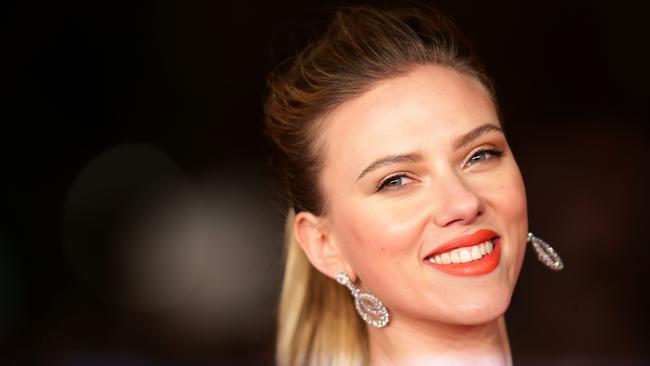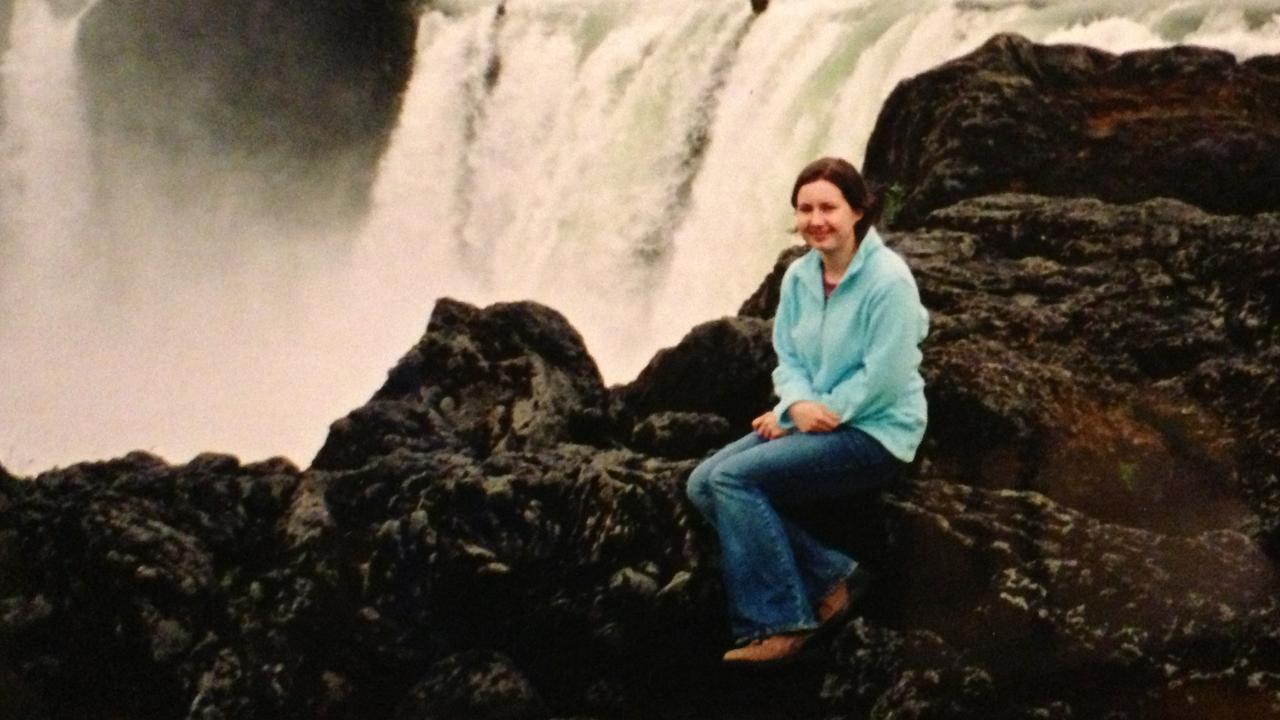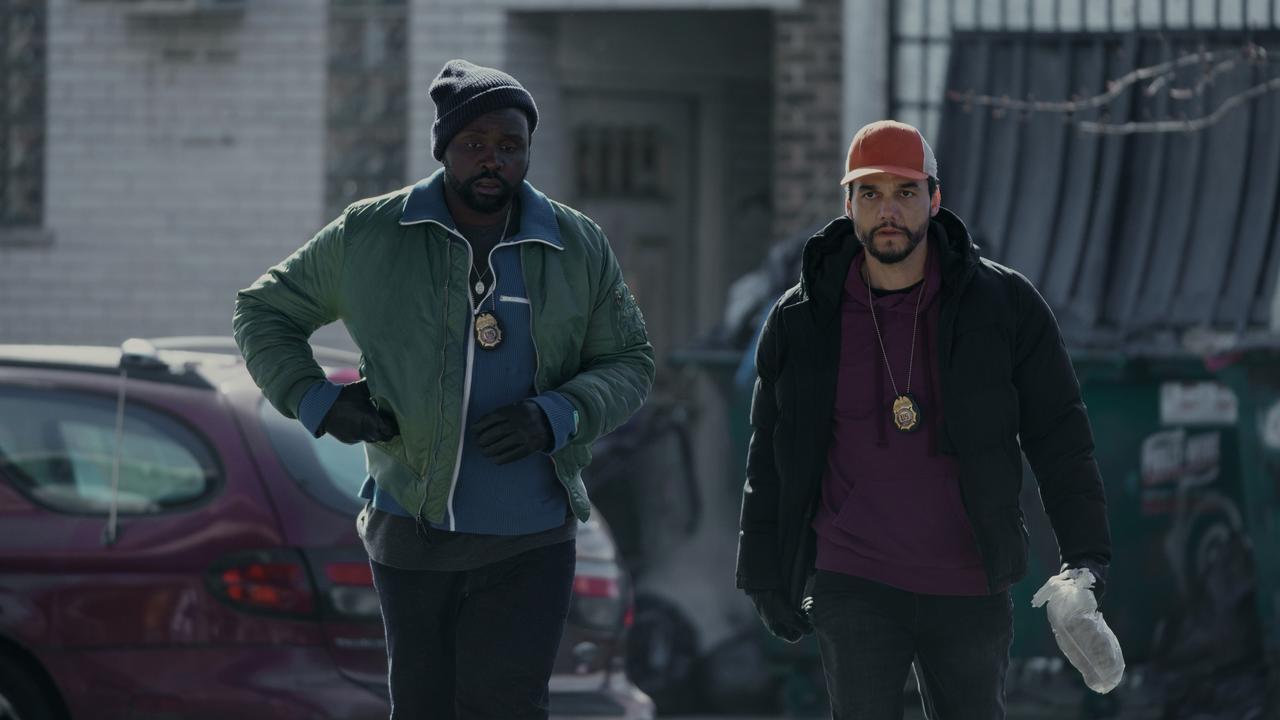Scarlett Johansson builds film career on her terms
SCARLETT Johansson’s success is built on a willingness to experiment.

IN the snow, New York City becomes a fantasy version of itself. A blanket of winter weather slows this frantic city down, hushes the hurly-burly, covers it in a quiet beauty that turns a mundane walk into a romantic stroll. Snowy New York is the New York you dreamed of: old-fashioned, elegant, irresistible. Until a city bus plows by at 100km/h and sprays you with muddy, brown slush.
I am going to meet Scarlett Johansson for lunch, and the midday snowfall somehow feels appropriate. By now it’s a thoroughly accepted premise that Johansson is herself a romantic throwback, a bit of an old-fashioned fantasy — a smoky-voiced reminder of a lush, more glamorous show-business era. I believe this makes me the 100,000th person to describe Johansson as “smoky-voiced”, for which I should have my computer keyboard stripped and tossed into the Hudson. But the cliche is true. So is the throwback part. Johansson’s choice of a meeting location today is not a sleek, modern aerie with angular furniture and Euro-disco, but the Carlyle Hotel, off Madison Avenue, a low-lit classic merrily frozen in time.
In the snow, I am 20 minutes late. She is 25 minutes late. This is OK. It doesn’t feel like a day to rush. When she arrives, she’s dressed in a black goose-down coat, a thick striped sweater and black wool pants, and she is wearing a pair of tortoiseshell eyeglasses that would fit comfortably on the nose of a prep-school English teacher. There is quick chatter about the weather and the craziness and the way the taxis and buses were swerving all over the road. And of course how this city looks perfect through it all. “A lot of people have that thing in New York where they need to get out — they’re like, ‘Oh you have to get out in order to love it,’ “ Johansson says. “I never had that.”
Yet she no longer lives in the city. At least not as much as she used to. Johansson grew up in New York, a child actress who attended the Professional Children’s School on West 60th Street, but she now spends most of her life in Paris, on the Left Bank, with her fiance, Romain Dauriac, a former magazine editor turned creative director of a French ad agency. Earlier this year she created a mild dustup with her adopted country, after joking on David Letterman’s talk show about the rudeness of Parisians. The comment was intended more as a wry observation than a scorching rebuke, but not everyone saw the humour.
“You’re allowed to complain about places you live because you love them,” Johansson explains. “Then I got off the stage and I go, ‘Oh my god, did I just offend a nation of people?’ ”
Johansson says Dauriac called and reassured her that her comments were accurate, that everyone in France said the same kinds of things about pushy Parisians. “But of course his father called him and said, ‘What is she smoking? What is she thinking?’ ” She laughs ruefully. “Hopefully they will accept me back there.”
THE first time I met Johansson was around the time she appeared — arrived is probably a better word — in Lost in Translation, Sofia Coppola’s subdued comedy set in Tokyo in which Johansson’s character, Charlotte, develops an unlikely friendship with a lonely movie star played by Bill Murray. It is crazy to think that Lost is more than 10 years old. Small but critically acclaimed, the film turned the then-teenaged Johansson (who had already appeared in movies such as The Horse Whisperer , Manny & Lo and Ghost World) into an instant sensation, the ingenue of ingenues. When I encountered her, she had platinum blonde hair and spent part of the interview trying to teach herself how to care for a Japanese Tamagotchi egg (remember those?). The crush of fame around her felt bright, new, fragile. Unspoken was how Hollywood could be cruel, especially on young actors. Who knew how this all would go?
It is more than a decade later and Johansson, now 29, is one of the most successful actresses of her generation — relevant, bankable and all those terrible, tacky words. But her success owes itself less to any kind of star-making algorithm than it does a willingness to step outside expectations and experiment. “She is not the kind of person or actress who has a master plan that she follows,” says Rob Ashford, who directed Johansson in her Broadway turn last year as Maggie in Cat on a Hot Tin Roof. “Her master plan is to keep working on projects that interest her, to continue being challenged.”
At the moment, Johansson is fresh off the success of Her, Spike Jonze’s moodily sweet romance starring Joaquin Phoenix as a man who falls in love with his operating system. Johansson plays the OS. It’s an unusual role: Johansson is heard and never seen, yet she imbues Samantha with such soul that she becomes a vivid character, as if fully fleshed. Johansson was a late arrival to the project — Jonze had already filmed a version of Samantha with actress Samantha Morton — and she is magnanimous about her predecessor’s contribution, calling the final product “sort of a combination of both of us”. Recording was harder than expected. Some scenes were filmed on a soundstage with Johansson housed in what she called “a tiny little isolated prison booth”, often with Phoenix visible in the distance.
The performance ended up being among the most celebrated of Johansson’s career. Though one critic was not convinced. At the moment, Johansson is the target of an amusing (and one-way) feud with Siri of the iPhone who, after a playful intervention by Apple programmers, described Johansson’s OS as “artificial”.
What the hell. When am I going to get this chance again? I remove my iPhone from my pocket and ask in the presence of the real thing: “What do you think of Scarlett Johansson?”
“I don’t think she’s going to have an opinion,” Johansson says. Siri pings a curt response: “I really couldn’t say.”
Interpret Siri how you wish. Her was the latest example of the auteur credibility and collaboration that has defined Johansson’s career. Already she has worked with Robert Redford, Coppola, Woody Allen (three times), Joel and Ethan Coen, and Jonze. She also made a stunningly well-received run on Broadway as Catherine in A View From the Bridge, winning a Tony award. But a few years back she realised there was something she hadn’t accomplished, and wanted: a role in a juicy blockbuster.
There had been unsuccessful attempts: 2005’s The Island, directed by Michael Bay, and The Spirit, written and directed by Frank Miller, which quickly came and went in 2008. She wanted to give it another try. She’d seen Robert Downey Jr and Gwyneth Paltrow in Iron Man and was struck by the intelligence wrapped around all that CGI.
“I was like, I want to be part of something big like that,” Johansson recalls. “I want to be in a really successful, huge film that’s good and works.”
Her candour on this subject is refreshing — but a butt-kicking part held other appeals to Johansson. “I wanted to prove to myself that I could do it,” she says. “I wanted to stretch myself physically, out of my comfort zone, and still succeed. I’m probably like most actors. We have huge egos, and you want to know you can be successful, no matter what. I don’t want to be pigeonholed in one genre or budget or whatever.”
Her breakthrough came in, of all things, 2010’s Iron Man 2, in which Johansson debuted as the cat-suited Natasha Romanoff, aka the Black Widow, of the Marvel comic universe. The sequel was a huge hit. Then Johansson’s Natasha headlined in Joss Whedon’s Avengers, alongside Downey Jr’s Iron Man as well as actors such as Mark Ruffalo (The Hulk), Chris Hemsworth (Thor) and Chris Evans (Captain America). Like Iron Man, Avengers paired its razzle-dazzle with genuine actor cred, and the film was catnip for superfans and mainstream audiences. Avengers earned an astonishing $1.5 billion worldwide, putting its all-time revenues behind only Avatar and Titanic.
“I don’t think anybody could have predicted how successful it would be,” Johansson says. “It was bananas. Totally bananas.”
She’d found her franchise. Johansson’s Natasha was seen last month with Evans in Captain America: The Winter Soldier, and of course there will be Avengers 2, scheduled to arrive next year. The films have broadened Johansson’s audience in unforeseen ways. “My friends’ kids are way more into me than they were before,” she says. “I don’t think they were even allowed to see half the movies I’m in. And now, kids are like, ‘Does Captain America have a sister?’ All these questions. ‘Who would win a fight between ...’ I get a lot of that.”
Should the success continue, there’s no reason the Avengers franchise can’t last for many years and spin-offs, though Johansson says the physical demands of her action parts are taking a toll. She ticks off her injury inventory: a painful wrist that “drives me nuts,” knee aches, pain on the side of her body. “I have all kinds of crazy things.”
Johansson will also be seen in Under the Skin, an arresting indie directed by Jonathan Glazer (Sexy Beast) opening on May 30. Johansson plays an alien who preys on a string of men in rainy Glasgow, but that description barely scratches the full experience.
Under the Skin is a striking, occasionally terrifying film about identity, with long, non-verbal stretches and hauntingly beautiful cinematography. Johansson spent many sessions discussing the film with Glazer, a director she admired, without being certain the film would become a reality.
“There are several directors with whom I’ve had kind of a creative relationship but have never worked with,” she says. “We like to imagine that we will, but who knows?” (Johansson’s spare performance did not surprise Glazer. “Good actors are able to tackle different roles,” the director says matter-of-factly.)
While there’s an ocean of difference between Under the Skin and a blockbuster, Johansson glides naturally between the two. She seems uninterested in taking any obvious path. “I’d rather take the chance of a film not working than be stuck in a pattern of making the same movie over and over,” she says. Getting older doesn’t unnerve her, either. “I don’t want to be the ingenue any more,” she says. “That part I’m happy about. It’s nice to be glamorous, but I don’t want to always have to be trendy and glamorous and an object of desire. I don’t want to be stuck in that forever. Because it doesn’t last.”
Still, Johansson speaks with urgency about the tension actresses often feel between balancing their careers and personal lives, particularly on the subject of family. It’s a topic that turns out to have happy urgency: Johansson and Dauriac are expecting a child. “It seems so stressful to not be able to spend time with your family because you’re constantly chasing the tail of your own success,” Johansson says. She continues: “There must exist a world in which I can balance those things, be able to raise a family and still make a film a year, or work on my own, develop things, do theatre. I want to be able to have it all.” She laughs. “Selfishly.”
“I know that with that there will be some sacrifices. I know that’s the struggle with working mothers and successful careers. It happens.” But the scent of double standard is obvious, and Johansson doesn’t shy from it. “With (male actors) it just doesn’t happen that way. You can be every woman’s fantasy, and nobody thinks twice about the fact that you have eight kids or whatever.”
She has learned to roll with the maddening frustrations of the business, and she hasn’t been unscathed by the celebrity grind. There was a marriage and divorce to actor Ryan Reynolds, a break-up that played out on the covers of supermarket magazines. There was a terribly invasive hacking crime in which Johansson’s (and other celebrities’) private information and photographs were stolen; the perpetrator jailed for 10 years. “A bumpy time” is how she describes that period. “But I always intended to get off that crazy gossip wagon and back to my regular life.”
As her 30s approach, Johansson seems content to fly low to the ground. Her relationship with Dauriac, whom she met in 2012, is not wild gossip fodder. “Our life is quiet,” she says. (As evidence, the couple has been mercifully spared a mortifying relationship acronym. “Scar-Ro? Scar-Main?” Johannson jokingly suggests.) She is vague about wedding timing (“our plan is to get married at some point”), but she admits that her French is rusty. Dauriac’s family mostly speaks French around her, but at home the couple usually sticks to English. “When you’re in a relationship with somebody and you’re communicating with them, you want to be as clear and concise as possible. We try to speak French a little, but it’s mostly like, ‘I like this sandwich.’ ‘That’s a nice colour.’ “ She intended to take a month off and study French with a tutor. “You go out, you go to a museum, order lunch, try to do a conversation.”
Afternoon beckons. It is time to go. Johansson pulls on her down jacket. Paris may be sublime. But outside it continues to snow, transforming New York into a captivating city that still very much feels like Johansson’s kind of town.
The Wall Street Journal Magazine
Under the Skin opens on May 30.


